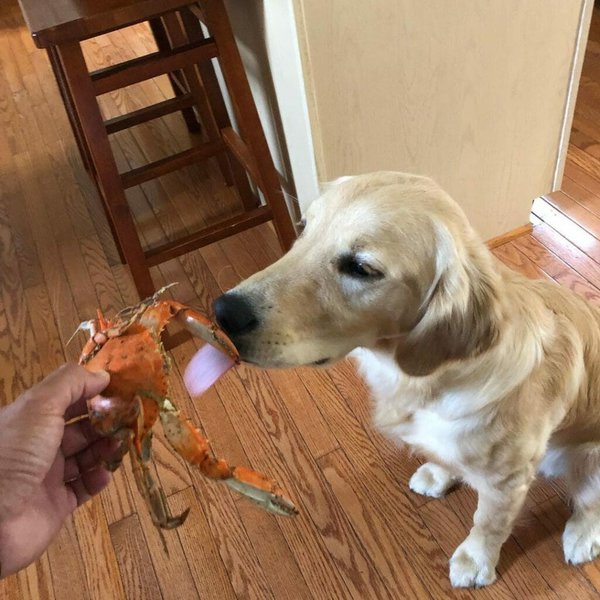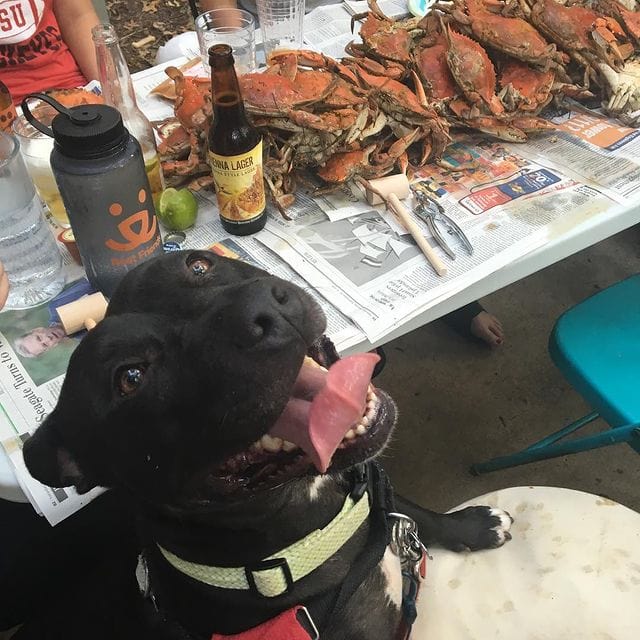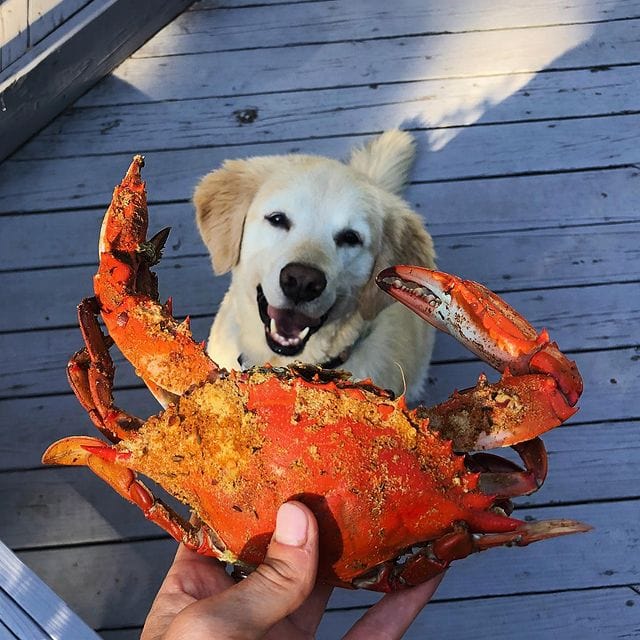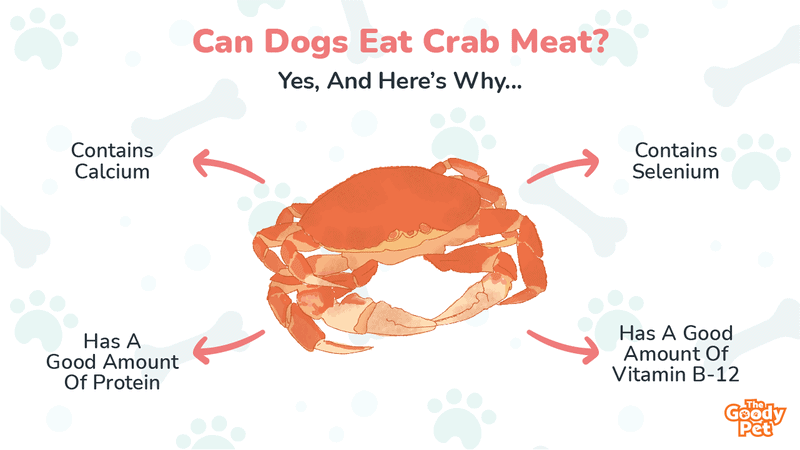It’s common knowledge that our diet reflects on those closest to us; this is especially true for our best friends – dogs. So, if you’re a seafood enthusiast like me, you may wonder whether your dog can enjoy delicious crab just like you.
Dogs can eat crab meat, and it is good for them. Crab meat provides a lot of protein for your pup and even contains heart-friendly omega-3 fatty acids highly beneficial to your dog.
Do you want to find out more benefits of crab meat for your canine buddy, and also the potential risks associated with feeding it crab meat? Then, why don’t you keep reading as I have written on these and more below?
Is It Safe For Dogs To Eat Crab Meat?

Crab meat is not typically toxic to dogs. Instead, it contains a lot of nutrients that are useful to the growth of your canine.
Nonetheless, it may contain certain chemicals that may pose health risks to your dog. For example, some seafood tends to have unnatural amounts of mercury due to pollution. This usually happens when waste matter from industries containing mercury is dumped into the ocean and is eaten by these poor sea creatures, including crabs.
Luckily, the cooking is left to seafood joints most times. So, sometimes the seafood is tested for mercury. Thus, the crabs you eat from there will most likely be mercury-free. But in a few cases, no tests are done. Sadly, if crab meat containing mercury reaches you and your dog, it could be potentially dangerous to both of you.
Furthermore, another concern you should have is bacterial contamination. If you’re cooking the crabs yourself, then there’s a higher risk of this issue affecting you and your dog.
Non-friendly species of bacteria, like Vibrio vulnificus, in improperly cooked seafood, like crab meat, is dangerous to your canine buddy.
Despite all these risks, if you can get good crab meat for your dog, the chances of these issues affecting your dog are small.
What About Cooked Crab Meat?
It’s perfectly safe for your dog to eat properly cooked crab meat. As aforementioned, crab meat contains a lot of nutrients that are highly beneficial to your furry friend.
As long as you provide crab meat that doesn’t contain mercury and is properly cooked, there’s no problem with it. Furthermore, it would also be best not to give your dog too much crab meat as there are also a few problems associated with it.
Is Crab Meat Healthy For Dogs?

Crab meat is very healthy for dogs. Nonetheless, as aforementioned, it all depends on whether it’s high-grade seafood and not bacteria-infested, improperly cooked crab meat.
Furthermore, crab meat contains many nutrients that are very beneficial to canines. Please keep reading as I’ll be talking about these benefits below.
Nutritional Benefits Of Crab Meat To Dogs
Crab meat contains calcium, protein, iron, omega-3 fatty acids, and other nutrients that are very important to your dog’s health.
Calcium
Calcium is an essential nutrient in every dog’s diet. It plays such a huge role in the body of canines that the importance of foods containing it can’t be overemphasized.
Calcium helps in the development of teeth and bones in dogs. It also regulates electron transmissions in the nervous system of your pooch.
In addition, crab meat is exceptionally rich in calcium. In fact, in every 3.5 oz of this seafood, there’s about 91 mg of calcium. So, it’s a pretty substantial amount and would form a healthy source of your pup’s daily recommended calcium intake.
Protein
Protein is another essential nutrient in dogs. Its primary function is to aid the development of tissue and repair worn-out ones.
Also, enzymes that play considerable roles in important biochemical reactions in your canine’s body are proteins themselves. Furthermore, certain vital hormones in your dog’s body are protein-based. For instance, insulin, which helps to regulate blood sugar levels, is made of proteins.
There are several other essential benefits protein plays in your pooch, and one good thing is that crab meat contains a lot of it. Three and a half ounces of crab meat contains about 0.6 oz of protein, which is a very good amount for your dog. So, if you give your dog crab meat, you’re providing it with a great source of protein that will keep its body in good shape.
Omega-3 Fatty Acids
Omega-3 fatty acids are special fats that are of significant value to every dog. But one thing that makes them so valuable is that your pooch’s body can’t produce them.
This means that the only way your furry friend can get them is by consuming foods that have them in substantial quantities. Unfortunately, there aren’t many foods with omega-3 fatty acids, so crab meat is pretty much special as it contains it.
Furthermore, omega-3 fatty acids play a huge role in your dog’s body. They form an integral part of cells called membranes. They control receptors present in these membranes, which affect many processes ranging from blood clotting to even blood flow regulation.
Also, numerous studies have shown that a diet rich in omega-3 fatty acids helps to lower the risks of heart diseases in dogs. So, if your dog is fed crab meat occasionally, it’s pretty much a healthy diet.
Selenium
Selenium is not one of the typical nutrients you know. Nonetheless, it plays a pretty important role in the body of your pooch. It is a very effective antioxidant. It helps to eliminate potentially dangerous reactive species of oxygen produced from metabolic activities.
Furthermore, it aids reproduction, and thyroid metabolism, which are critical areas of each dog’s life. Luckily, crab meat contains selenium in substantial quantities.
Vitamin B-12
Vitamin B-12, or cobalamin, is present in substantial quantities in crab meat. It serves many functions ranging from being a significant factor influencing red blood cell formation to even nervous system coordination.
Also, vitamin B-12 helps to reduce the risk of obesity in dogs by enabling fat synthesis. Furthermore, folic acid, which helps provide energy for your dog’s body, needs vitamin B-12 to be absorbed.
So, if your dog eats crab meat, it’s getting a healthy dose of vitamin B-12.
Is Imitation Crab Meat Good For Dogs?
Imitation crab meat is suitable for dogs as long as it’s prepared well. Nonetheless, it’s much better to give your dog crab meat because of the low nutrients it contains.
Imitation crab meat is typically made from white fish flesh and starch, although newer recipes now include egg whites. However, it isn’t the real deal.
It contains a lower amount of nutrients than actual crab because it’s highly processed. For example, one hundred grams of crab meat contains 0.6 oz of protein. On the other hand, imitation crab meat has just 0.3 oz.
Also, other nutrients like calcium, selenium, and vitamin B-12 are in minimal quantities. And even the omega-3 fatty acid content of well-made imitation crab meat is negligible.
The starch content of imitation crab meat also raises its calorie count without even providing enough nutrients to back it up. Just 3.5 ounces of it has a 95 kcal count. Also, its carb content of 0.5 oz comprises very little fiber.
So, while giving your dog imitation crab meat won’t affect its health in a negative manner, this still won’t do as much good as the same amount of crab meat would.

Are Crab Sidings Good For Dogs?
Typically, crab sidings, like shrimp, are suitable for dogs. But some other sidings, like butter, can be fatal to your furry friend.
Crab sidings help to boost the flavor of crab meat. And you can’t deny it either; crab meat tastes much better with one or two sidings.
Nonetheless, for your dog, some sidings can pose a threat to its health, while others are beneficial. Looking forward to knowing which crab sidings are suitable for your pup and which ones aren’t? Please keep reading to find out.
Can Dogs Have Shrimp And Crabmeat?
Dogs can have shrimp and crab meat. Shrimp isn’t toxic to dogs. Like crab meat, it even contains a good amount of protein and other nutrients like calcium. These nutrients play essential roles in fundamental processes such as bodybuilding and providing energy for your dog.
For example, calcium, zinc, and iron, all in relatively substantial quantities in shrimp, are electrolytes. These electrolytes are essential for maintaining coordination within the nervous systems in dogs. And because your dog’s body doesn’t produce enough of them, shrimp is a significant source.
So it’s an excellent addition to your dog’s dish. However, to avoid your dog choking on it, it would be best to give it very tenderized shrimp. The only downside to this is that it would have lost some of its nutrients when cooked for so long. Nonetheless, it’s perfect for your dog.
Can My Dog Eat Crab With Butter?
It’s not healthy for your dog to eat crab with butter. Butter isn’t precisely toxic to dogs, but it can pose a lot of health risks.
Butter doesn’t also provide your dog with the healthy nutrients it needs. So, it’s not even essential in the food you give your pup.
So you may wonder why something of negligible nutritional value should even bother your dog. Well, butter comes with a lot of fat, and it’s an unhealthy kind. Saturated fats comprise about 80 percent of butter’s total mass. These fats take a lot of time to break down and are not even used by your dog’s body often.
Thus, if your dog consumes butter, saturated fats will be deposited in some regions of its body and blood vessels as cholesterol. So, if your canine buddy consumes butter, its chances of having cardiovascular diseases and becoming obese are pretty high.
Furthermore, your dog consuming a fatty meal could potentially cause it to develop pancreatitis. Pancreatitis occurs when the pancreas of your dog becomes abnormally inflamed and unable to carry out essential functions.
Its symptoms — nausea, abdominal pain, fever, and lethargy — are disheartening and could put your dog in critical condition. It’s a pretty dangerous disease and could ultimately lead to your pup’s death.
So, with butter being so high in fats, giving your dog crab meat with butter is a nasty move.

Can My Dog Eat Crab Cooked With Thyme?
Your dog can eat crab cooked with regular thyme. On the other hand, Spanish thyme, another common thyme variety, is toxic to dogs. So your dog should not have crab meat cooked with Spanish thyme.
Regular thyme in dog food doesn’t cause any problems in dogs, especially in small quantities. Thyme even helps in soothing dogs’ troubled guts. So, if your dog has a tummy ache, try giving it some food with a bit of thyme.
Furthermore, gut hookworms do not like thyme at all. So, some usually die off when it’s in the digestive tract of your pooch. So, crab meat cooked with regular thyme is safe for your dog.
On the other hand, Spanish thyme is very dangerous to your dog’s health. This is because it contains diterpene and some other oils that are toxic to dogs.
If your dog eats food containing Spanish thyme, it can suffer from the effects of Spanish thyme poisoning — symptoms of this malady range from diarrhea to irritation of the dog’s mouth and even lethargy.
Ultimately, it could lead to death if left untreated. So, giving your dog crab meat cooked with Spanish thyme is very dangerous.
What Happens If My Dog Eats Bad Crab Meat?
Giving your dog bad crab meat could lead to a couple of issues ranging from mercury poisoning to a bacteria infestation.
Do you want to find out more about these risks? Then please keep reading as I have outlined them below.
Mercury Poisoning
As aforementioned, it’s quite possible for the crabs you and your pooch eat to contain substantial amounts of mercury. Unfortunately, mercury is a liquid metal at room temperature, so it’s almost impossible to identify crabs that have ingested it since it must have entered their bloodstreams.
Crabs can eat various things ranging from coral flora to insects, small fish, and even other crabs. To make things worse, crabs can be desperate scavengers. So on beaches, where food becomes scarce, and there’s a lot of washed-up waste, they will eat anything they can lay their claws upon.
Thus, it’s not entirely surprising that crabs will consume an incredible amount of accumulated mercury on banks while foraging.
Sadly, mercury poisoning is a serious issue that can be lethal in dogs. Its symptoms range from loss of coordination and feeling in paws to tremors, anxiety, vomiting blood, kidney failure, and ultimately, death.
Luckily, the chances of this happening are rare. But immediately you notice these symptoms in your pup, it would be best to call for the help of a vet.

Sodium Overdose
It’s common knowledge that seawater is quite saline. So, it’s no surprise that crabs tend to have a high salt content too. Sodium is one of the constituents of salt, and in excess amounts in your dog, it could cause problems.
Most restaurants tend to cook crabs with salt, knowing that they naturally have relatively high sodium. Nonetheless, if your furry friend keeps eating crabs that have more than the average amount of salt in them, it could lead to a sodium overdose.
An overdose of sodium in dogs is hazardous because of the effects it has. Some of the symptoms of this abnormality include vomiting, tremors, constant thirst, diarrhea, and even seizures. Unfortunately, death usually follows these symptoms in severe cases if left untreated.
Bacteria Infestation
Sea creatures harbor a lot of bacteria. Furthermore, being scavengers make crabs even better hosts to these bacteria.
As with humans, dogs tend to have a lot of problems when they eat improperly cooked seafood. This is because there are several species of bacteria, and some can be very dangerous.
In some cases, improperly cooked seafood can even contain flesh-eating bacteria. So the symptoms of a bacteria infestation in your pooch if it happens to eat improperly cooked crab meat could vary among dogs.
Apart from the common stomach upsets, the symptoms could range from vomiting to even tissue loss. Luckily, if it’s not severe, there’s a high chance that you can save your dog if you seek a vet for emergency assistance.





